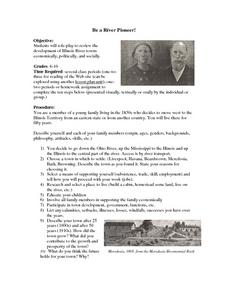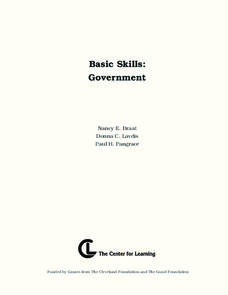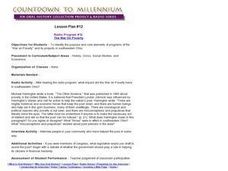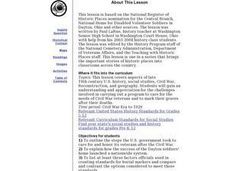Curated OER
The Final Countdown
Students examine the United States electoral college system as it applies to the 2004 presidential election. They investigate the impact of the twelve battleground states in the 2004 election and develop informative pamphlets on the...
Curated OER
Cell Phones Create Dangers
Students research what laws, if any, relate to cell phones in your state and community. Students interview local law enforcement personnel to find out if cell phones have caused accidents in your town or city. Try to get statistics on...
Curated OER
Life before Congress
Students name some interesting backgrounds of Members of Congress, identify their current representatives in the legislative branch of the national government, and describe the background of one local representative or senator.
Curated OER
Lincoln and the "Writ of Liberty"
Students debate and explore the rationale and ethics behind Lincoln's 19th century suspension of habeas corpus - the 'writ of liberty' and answer related questions.
Curated OER
Be a River Pioneer!
Students role-play as pioneers in Illinois river towns. They research and choose a home town and participate in the development of the town. They present their simulation in either a written report or visual presentation.
Curated OER
Comparing Canadian and U.S. Political Systems and Political Campaigns
Students interpret historical evidence presented in primary and secondary resources. In this political systems instructional activity, students conduct research to compare and contrast the forms of government in the ...
Curated OER
World War Ii - Japanese American Internment
Ninth graders determine that nationality is not defined by race, especially in the United States. They group into teacher created dyads with eight pictures. Four pictures are of American citizens (multiracial representations), and...
Curated OER
Roles of Individuals and Groups in Politics
Students review the Federalist Paper by James Madison. They discuss the influence of interest groups in contemporary politics.
Curated OER
Woodrow Wilson and American Involvement in the Great War
Students examine American involvement in World War I. In this World War I lesson, students investigate Wilson's policy of neutrality as they read excerpts from his messages to Congress. Students respond to questions regarding the...
Curated OER
The Bill of Rights
Students classify the Bill of Rights. In this U.S. Constitution lesson, students complete provided readings and worksheets in order to define, identify and analyze each of the amendments and explain why they were included in the...
Curated OER
The Bill of Rights is a-Rockin
Young scholars explore the U.S. Constitution through music. In this Bill of Rights lesson, students discuss a hypothetical case regarding lyrics by Madonna and the historical Massachusetts Blue Laws. Young scholars use the Bill of Rights...
Curated OER
Need for Reconstruction: Devasation and Liberation in the South
Eighth graders examine the amount of destruction in the South following the Civil War. They explore the reasons why Reconstruction was needed.
Curated OER
Radio Program #12-The War On Poverty
Students identify the purpose and core elements of programs of the "War on Poverty" and its projects in southeastern Ohio. Students interview people in their community who have helped the poor in some way. Explore unique ways to help...
Curated OER
The Eiserloh Story
Students read "The Eiserloh Story" and evaluate decisions made by the government in time of war. They determine if the government violated the rights of innocent civilians. They identify the Bill of Rights and analyze each Right.
Curated OER
Camp Chase Confederate Cemetery
Students use maps, readings and photographs to locate prisoner of war camps in the North during the Civil War. They identify the camp's population sizes and mortality rates and how the camps' uses have changed over time.
Curated OER
National Home for Disabled Volunteer Soldiers i
Students explore the challenges involved in carrying out a program to care for the needs of Civil War veterans an to mark their graves after their deaths. The biography of a veteran from the community is researched and written in this...
Curated OER
Statehouse Time Capsule
Fourth graders create a time capsule that is representative of their community. They explain why the chosen objects are representative of themselves or their community.
Curated OER
First Amendment Rights
Fifth graders participate in a problem-solving and decision-making process involving the First Amendment rights to analyze and implement a solution for a school-related issue. They are given a variety of scenarios to apply the First...
Curated OER
Schools look for funding solutions
High schoolers investigate the problem of funding for the school district. They conduct interviews with various school officials to gather both opinions and important information about the issue.
Curated OER
Renaiisance In Ancient Egypt
Eleventh graders conduct research about the development of technologies in Ancient Egypt. The research is used to make class presentations. The students work with the teacher in order to create a rubric for the assignment.
Humanities Texas
Primary Source Worksheet: Thomas Jefferson, Message to Congress Concerning Louisiana
Proficient reading of informational text, especially primary source documents, requires practice. This message from Thomas Jefferson about the Louisiana Purchase offers readers a chance to develop these comprehension skills.
Curated OER
What's Legal with Music on the Web?
Student research legalities of downloading music from Internet, gather information on citizens who have been charged with downloading/copyright crimes, find out who is working to create new laws dealing with this technology, explore what...
Curated OER
Land Use and Nitrogen
Students consider the effects of development on water quality. They test nitrogen levels in waters before and after development, investigate wastewater treatment options and research best management practices to reduce nitrogen loads.
Curated OER
Early Voting, Other Election Changes are Possible
Students use the internet and linked sites to explore current voting methods in their community. They research suggestions that have been made for changes and interview people who made these suggestions (when possible). Students suggest...

























